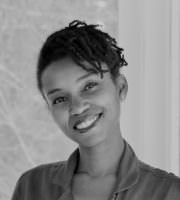by Kyla Marshell
I’m trying to help
him with his social studies,
when little Branford, named for the sax great,
tells me he doesn’t like my afro; asks why
my skirt comes up so high on my waist,
and why I’m so skinny: “What you weigh—like, fifty pounds?”
Stay unhurt, I tell myself—though these are the things adult black
men have said to me, trying to help
me become more appetizing to their eyes
and hands. These young black men—
nine, ten, eleven years old—look at them,
look how they all gravitate towards the one light-skinned girl
in the class; how easily they make beats on the desks
with markers and pencils; how swift they are to brag
about how far they can shoot balled-up
loose leaf into the trash. Look how they want to rap
instead of read, how they accuse each other of being gay,
how already, their made-up schoolyard songs are about sex;
how their little lives, half-formed, are so much like the lives
of grown-ups. They are the makings of Morehouse,
prime for greatness, or disaster,
and unable to see themselves ten years from now,
in college, in jail, in the NBA, in the White House, and some
of them, already unwilling to try.
I look at Branford, who wants to be a basketball player, or
a construction worker, like his dad. I look at Branford, the great
debater, who could convince anybody of anything, who always
does his research, who always asks why. He looks up at me, asking
another question, and I crouch down, back to his level.
“Paris,” I answer, and he writes what I say.
Last updated July 25, 2022




